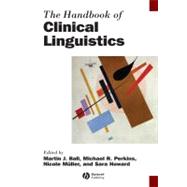
What is included with this book?
Michael R. Perkins is Professor of Clinical Linguistics in the Department of Human Communication Sciences at the University of Sheffield, England.
Nicole Müller is Hawthorne-BoRSF Endowed Professor in the Department of Communicative Disorders at the University of Louisiana at Lafayette.
Sara Howard is Senior Lecturer in Clinical Phonetics in the Department of Human Communication Sciences at the University of Sheffield.
Notes on Contributors.
Introduction (Martin J. Ball, Michael R. Perkins, Nicole Müller, and Sara Howard).
Part I Pragmatics, Discourse, and Sociolinguistics.
1 Discourse Analysis and Communication Impairment (Nicole Müller, Jacqueline A. Guendouzi, and Brent Wilson).
2 Conversational Implicature and Communication Impairment (Elisabeth Ahlsén).
3 Relevance Theory and Communication Disorders (Eeva Leinonen and Nuala Ryder).
4 Neuropragmatics (Brigitte Stemmer).
5 Pragmatic Impairment as an Emergent Phenomenon (Michael R. Perkins).
6 Conversation Analysis and Communication Disorders (Ray Wilkinson).
7 Clinical Sociolinguistics (Jack S. Damico and Martin J. Ball).
8 Systemic Functional Linguistics and Communication Impairment (Alison Ferguson and Julie Thomson).
9 Cross-Linguistic and Multilingual Perspectives on Communicative Competence and Communication Impairment: Pragmatics, Discourse, and Sociolinguistics (Zhu Hua and Li Wei).
Part II Syntax and Semantics.
10 Chomskyan Syntactic Theory and Language Disorders (Harald Clahsen).
11 Formulaic Sequences and Language Disorder (Alison Wray).
12 Syntactic Processing in Developmental and Acquired Language Disorders (Theodoros Marinis).
13 Morphology and Language Disorder (Martina Penke).
14 Normal and Pathological Semantic Processing of Words (Karima Kahlaoui and Yves Joanette).
15 Neural Correlates of Normal and Pathological Language Processing (Stefan Frisch, Sonja A. Kotz, and Angela D. Friederici).
16 Bilingualism and Language Impairment (Jan de Jong).
17 Cross-Linguistic Perspectives on the Syntax and Semantics of Language Disorders (Martha Crago, Johanne Paradis, and Lise Menn).
18 Interfaces between Cognition, Semantics, and Syntax (Maria Black and Shula Chiat).
Part III Phonetics and Phonology.
19 Instrumental Analysis of Articulation in Speech Impairment (Fiona E. Gibbon).
20 Instrumental Analysis of Resonance in Speech Impairment (Tara L. Whitehill and Alice S.-Y. Lee).
21 Instrumental Analysis of Phonation (Shaheen N. Awan).
22 Acoustic Analysis of Speech (Ray D. Kent and Yunjung Kim).
23 Clinical Phonetic Transcription (Barry Heselwood and Sara Howard).
24 Comparisons in Perception between Speech and Nonspeech Signals (Tessa Bent and David B. Pisoni).
25 Phonological Analysis, Phonological Processes (Adele W. Miccio and Shelley E. Scarpino).
26 Constraints-Based Nonlinear Phonological Theories: Application and Implications (Barbara M. H. Bernhardt and Joseph P. Stemberger).
27 Optimality Theory: A Clinical Perspective (Daniel A. Dinnsen and Judith A. Gierut).
28 Government Phonology and Speech Impairment (Martin J. Ball).
29 Articulatory Phonology and Speech Impairment (Pascal H. H. M. van Lieshout and Louis M. Goldstein).
30 A Cognitive Approach to Clinical Phonology (Anna Vogel Sosa and Joan L. Bybee).
31 Neurophonetics (Wolfram Ziegler).
32 Coarticulation and Speech Impairment (Bill Hardcastle and Kris Tjaden).
33 Vowel Development and Disorders (Carol Stoel-Gammon and Karen Pollock).
34 Prosodic Impairments (Bill Wells and Sandra Whiteside).
35 Speech Intelligibility (Gary Weismer).
36 Connected Speech (Sara Howard, Bill Wells, and John Local).
37 Sociophonetics and Clinical Linguistics (Gerrard Docherty and Ghada Khattab).
38 Cross-Linguistic Phonological Acquisition (David Ingram).
Author Index.
Subject Index.
The New copy of this book will include any supplemental materials advertised. Please check the title of the book to determine if it should include any access cards, study guides, lab manuals, CDs, etc.
The Used, Rental and eBook copies of this book are not guaranteed to include any supplemental materials. Typically, only the book itself is included. This is true even if the title states it includes any access cards, study guides, lab manuals, CDs, etc.